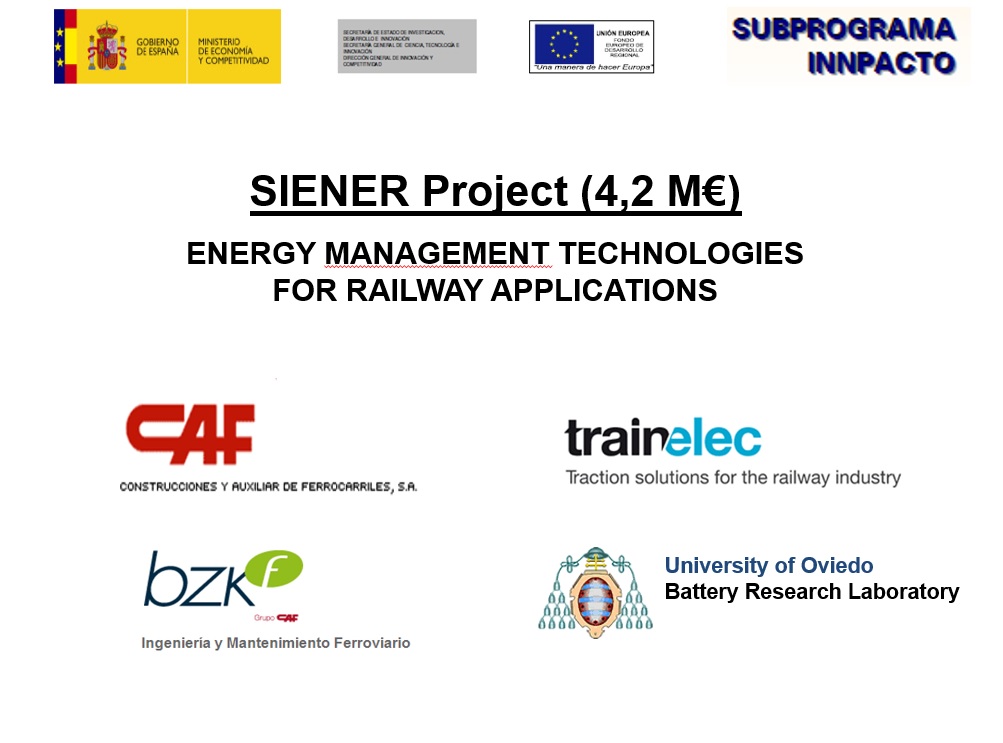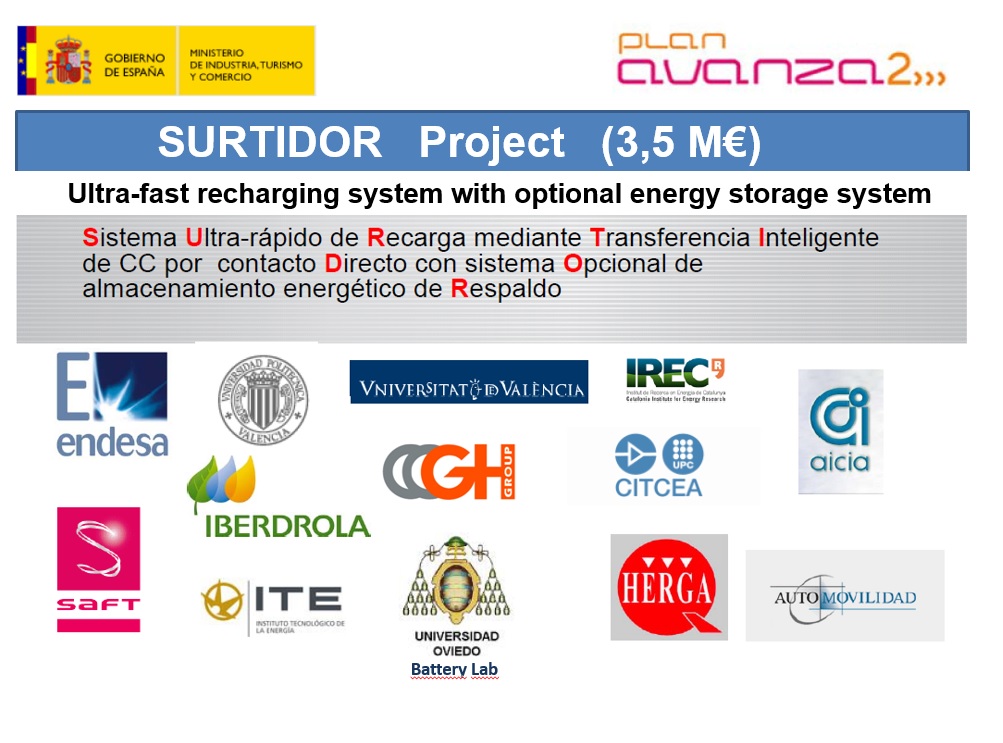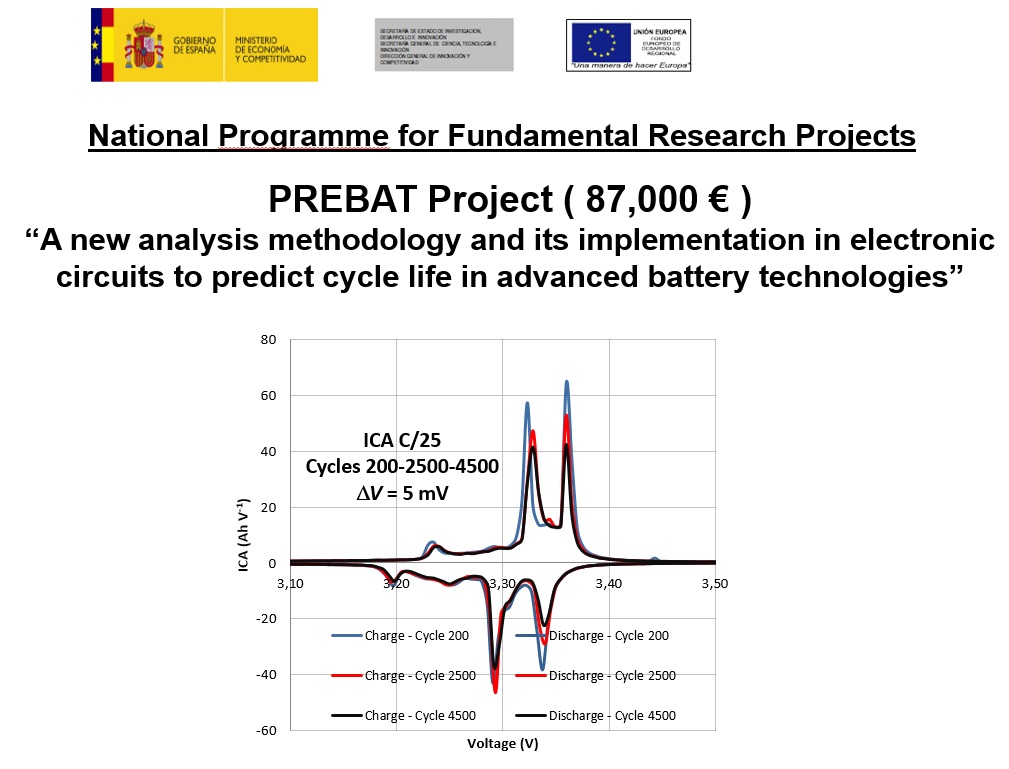
Title of the Project: Energy management technologies for railway applications (SIENER) Program: The Spanish Ministry of Science and Innovation,Plan Impacto (MICINN-10- IPT-370000-2010-15) Description and objectives: The general objective of the project was to develop new technologies and systems for the optimization of energy management in railway vehicles, increasing the ratio of energy use to levels close to 100%, through the combination of different technological developments. With regard to the storage system, the main objectives of the project were: to study the application of different electrochemical energy storage technologies (batteries, supercapacitors, mixed systems) to the field of railway traction, to develop a prototype with the most suitable technology, and to test it under different conditions for determining performance and cycle life. Participant Entities: CONSTRUCCIONES Y AUXILIAR DE FERROCARRILES Inc. (CAF) (coordinador), CAF INVESTIGACIÓN Y DESARROLLO Ltd., TRAINELEC S.L., BIZKAIA FERROVIARIA Ltd., Universidad de Oviedo./* Duration: 42 Months (2010-2013) Results: Energy storage system for railway applications based on the use of new battery technologies, currently in application. Total Funding: 4.2 M€



Title of the Project: Ultra-rapid Recharging System using Intelligent DC Direct Contact Transfer and Optional Backup Energy Storage System (SURTIDOR) Program: The Spanish Ministry of Industry, Transport and Trade, Plan Avanza(MITC-10-TSI-020302-2010-127) Description and objectives: The scientific-technological objective of the SURTIDOR project was the conception, theoretical study, design and experimental verification of an ultra-fast recharging station for electric vehicles, with direct contact power transfer. The project included a battery-based back-up energy storage system to reduce the station's impact on the power grid, a bi-directional converter to allow connection to the grid or to alternative generation systems, and an integral station management system. Participant Entities: GH ELECTROTERMIA Inc. (coordinador), TALLERES HERGA Inc., IBERDROLA GENERACIÓN Inc., ENDESA INGENIERÍA Ltd., SAFT BATERÍAS Ltd., DESARROLLO AUTOMOVILIDAD Ltd., Instituto de Tecnología Eléctrica de Valencia (ITE), Universidad de Oviedo, Universidad Politécnica de Cataluña Duration: 31 Months (2010-2012) Results: _ Ultrafast 50kW electric vehicle charger, currently on the market. _ Prototype of EV ultra-fast recharging station with a backup storage system based on batteries and the possibility of returning energy to the electrical grid. Total Funding: 3.5 M€

Title of the Project: Application of a new analysis methodology to the development of electronic circuits for predicting the cycle life of advanced battery technologies (PREBAT) Program: The Spanish Ministry of Science and Innovation and European Regional Development Fund (ERDF)( MICINN-09-TEC2009-12552) Description and objectives: In the first stage of the project, new Li-ion battery technologies based on the use of nanomaterials were identified. This was followed by the characterization of mechanisms that cause the degradation of LFP batteries with nanomaterials throughout their cycle life. After that, a method to estimate the aging of batteries was designed. Finally, an electronic prototype that implements the designed method was developed, making possible the prediction of the remaining useful life of LFP batteries. Participant Entities: Universidad de Oviedo and Observer/Promoting Entity (SHORTES ESPAÑA S.A) Duration: 36 Months (2010-2012) Results: _ Methodology for the estimation of the aging of Li-ion batteries. _ A prototype of an electronic circuit for the prediction of the remaining useful life of LFP batteries. Total Funding: 87 K€


Title of the Project: Characterization of Li-ion batteries (Li-Bat) Program: FUO-EM-157-11 (Fundación Universidad de Oviedo) Description and objectives: In the project, Li-ion cells of medium/large capacity were testing under different operation conditions, including different ambient temperatures. On the basis of the results obtained, the electrical and thermal characterization of these cells was carried out, and their suitability for railway traction applications was evaluated comparatively. Participant Entities: CONSTRUCCIONES Y AUXILIAR DE FERROCARRILES Inc. (CAF), Universidad de Oviedo. Duration: 12 Months (2011-2012) Results: Electrical and thermal characterization of Li-ion cells of medium/large capacity for railway traction applications. Total Funding: 82 K€

Title of the Project: Increasing the energy efficiency in electric vehicles by determining the state-of-charge and state-of-health of the battery with a BMS based on an adaptive model (MOBADAP) Program: _ Ministerio de Economía y Competitividad (MINECO-13-DPI2013-46541-R) _ Consejería de Educación y Ciencia del Principado de Asturias (SV-PA-13-ECOEMP-63) Description and objectives: The general objective of this project was to increase the efficiency and reliability of electric vehicles by using optimized battery management techniques based on the determination of the state-of- charge (SoC) and the state-of-health (SoH). This would also reduce the cost of the electric vehicle as it would not be necessary to oversize the battery and it would extend the battery service life. Participant Entities: Universidad de Oviedo and Observer/Promoting Entities (CAF Power & Automation S.L.; SCHNEIDER ELECTRIC S.A.) Duration: 45 Months (2013-2016) Results: _ Characterization of Li-ion batteries for their use in Electric Vehicles (EVs). _ Design of fast-charging methodologies for EV batteries. _ Obtaining battery adaptive models that allow the estimation of the battery state-of- charge (SoC) and the battery state-of-health (SoH) in EV applications. The models can be implemented in Battery Management Systems (BMS). Total Funding: 90 K€

Title of the Project: Data Engineering applied to Efficient Energy Management Program: Consejería de Economía y Empleo del Principado de Asturias (FC-15-GRUPIN14-073) Description and objectives: The final purpose of the research was the design of efficient and reliable management systems for Battery Energy Storage Systems (BESS) used to support renewable energy generators. The management system would be based on a model that integrates both the main parameters that affect the behavior of the battery and its evolution over time. Participant Entities: Universidad de Oviedo Duration: 36 Months (2015-2017) Results:_ Application of new learning methodologies to the problem of determining the state-of-charge (SoC) and the state-of- health (SoH) in batteries used in BESS to support renewable energy generators. _ Obtaining battery adaptive models that allow estimating the state-of-charge (SoC) and the state-of-health (SoH), in BESS applications. _ Optimization of battery energy management in BESS, to ensure their performance and a long service life. Total Funding: 162 K€

Title of the Project: Optimized management of BESS (Battery Energy Storage Systems) for a quality electrical network: Predictive degradation models for advanced lithium technologies (SmartBESS) Program: Ministerio de Economía y Competitividad (MINECO-TEC2016-80700-R) Description and objectives: One of the main objectives of this project is to evaluate comparatively the performance of novel Li-ion technologies under realistic BESS testing conditions, with special attention to efficiency, safety and costs. This objective requires a prior analysis of the power profiles in BESS, aiming to design realistic testing protocols. The second objective is the development of degradation models in Li-ion batteries to attain diagnosis and health state assessment in BESS, by using non-invasive, in-situ techniques to be directly applied online in BMS. Finally, prognosis models to estimate the service life and anticipate fault incidences will be developed. Participant Entities: Universidad de Oviedo and Observer/Promoting Entity (WorleyParsons "Resources and Energy") Duration: 48 Months (2017-2020) Results: _ Identification of the most suitable Lithium technologies for using in Battery Energy Storage Systems (BESS). It has also taken into account technologies that are used in medium/large electric vehicles (Battery Electric Buses, BEBs) and that could be valid to develop a "second life" in BESS applications. _ Development of test protocols both for the characterization and initial evaluation of the selected technologies and for their ageing under profiles that emulate the behavior of the systems (BEBs and BESS). _ Characterization of the degradation phenomena that affect the selected Lithium technologies. _ Definition of degradation models for the diagnosis of the battery state-of-health (SoH). _ Models adaptation for their use in prognosis: estimation of the remaining useful life (RUL) of the batteries and failure prevention. Total Funding: 128 K€

Title of the Project: Data Engineering applied to Eco-Efficient Energy Management. Program: Consejería de Economía y Empleo del Principado de Asturias (IDI/2018/000226) Description and objectives: The eco-efficient management of a device is closer to the energy neutrality pursued in the Paris agreements than the strategy of minimizing energy consumption. The problem is that the electricity consumption of a process can be accurately estimated, but greenhouse gas (GHG) emissions during the life cycle of a device depend on the evolution of its deterioration and possible breakdowns. At the same time, device health models are complex and can rarely anticipate the exact timing and severity of each failure. Hence the approach of the following objectives concerning batteries: - Determination of minimum specifications for health prognosis models integrated into eco-efficient energy management systems. In particular, it is interesting to know how accurately the health degradation of Li-ion batteries can be anticipated while in service in an electric vehicle (EV) or Battery Energy Storage System (BESS). - The application of Data Engineering to optimize energy management systems or to forecast failures is suitable for large systems, but the complexity of the algorithms may be unbearable in low-consumption processes. In particular, this problem is relevant to battery-powered biomedical systems. Therefore, the optimization of these algorithms or the change to a different computing paradigm, in which the consumption is lower, is considered. Participant Entities: Universidad de Oviedo Duration: 36 Months (2018-2020) Results: _ Generation of the cell mechanistic models for simulation: Opening of fresh commercial cells, extraction of samples of electroplated materials, and construction of Swagelok half-cells. Semi-cell testing and material characterization. _ Models for estimating the state-of- health of cells: prediction of electrode capacity loss, anode phase concentration equilibrium, and other predictable evolving deterioration using models of observable variables. _ Algorithms of characteristic selection with associated costs, applicable to the improvement of the energetic consumption of small devices. Total Funding: 182 K€

Title of the Project: Performance increase on portable equipment using new Li-ion battery technology and development of electronic circuits for an efficient energy management Funding Entity: Ministry of Science and Technology and European Regional Development Fund (ERDF) Participant Entities: Universidad de Oviedo and Adaro Tecnología Inc. Duration: 36 Months (2002-2005) Total Funding: 47.990 €
